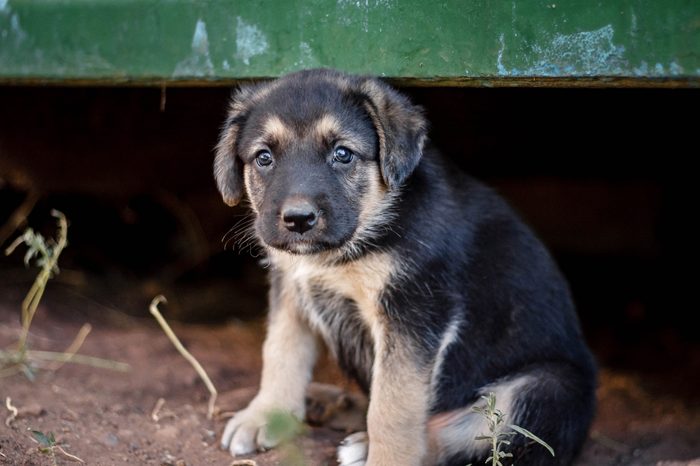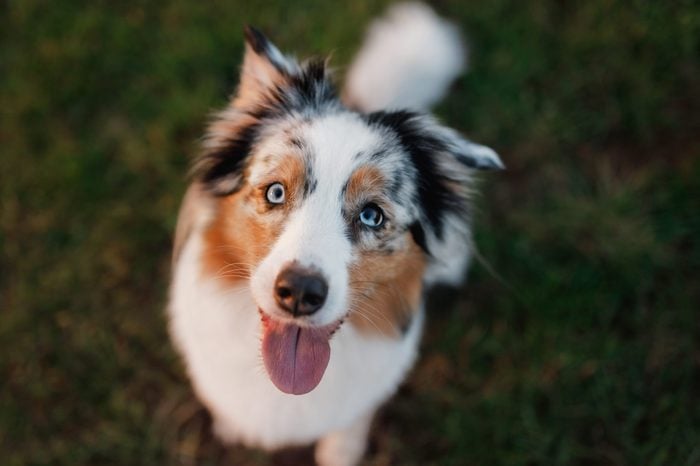What Laws Protect Puppy Mill Owners Against Animal Abuse?
2 / 11

What the law covers
The PACT Human activity makes animal cruelty and corruption illegal on a federal level, allowing for federal charges for the acts of crushing, burning, drowning, suffocating, impaling, and sexually exploiting animals. Jme Thomas of Motley Zoo Animate being Rescue says, "PACT is a disquisitional step in animal rights considering it brings animals to a higher level of recognition," in the optics of the law. "This legislation raises their status from that of property to one of a living beingness sensitive to pain," she says. If your domestic dog could talk these are the 30 secrets it would tell you.
iii / 11

Why was the police necessary?
Because animals are considered belongings in the United States, it makes convictions of animal cruelty very difficult, explains Kelly Reeves, co-founder and president of Hand Prints in the Sand Animal Rescue. "This is a pace in the correct direction to seeing animals as sentient beings and not only a slice of belongings."
That said, many animal rights activists yet believe the PACT Act falls curt. "Unfortunately, there is however so much more that could be washed to bring the treatment of animals every bit a whole to a humane, sentient level," says Thomas. I large expanse where the new pecker is considered inadequate: Puppy mills.
4 / 11

What are puppy mills?
Puppy mills are exactly what they sound like: Large-scale breeding operations. Their mission? Churning out equally many puppies as possible for monetary proceeds. "At puppy mills, animals are bred over and over without consideration for their well-being or temperament," Thomas says. "Because of this, animals become products; and when living beings are treated every bit a commodity, their quality of care always suffers."
If the idea of that makes your eye hurt, have a break with these adorable puppy pictures that will brand you melt.
5 / 11

What are some of the biggest concerns about puppy mills?
Nigh puppy mills are loud, scary places where the dogs are given the blank minimum food and water and kept in constant confinement, frequently adjacent to their own waste, Thomas says. "Many of the dogs have never been out of their cages and do not sympathise grass or sunshine."
In add-on, "The dogs are denied acceptable veterinary care, so many suffer and die of very treatable conditions," Thomas says. "That's partially because there are then many animals no one notices, but also because their value is not in being healthy, merely producing." Responsible pet owners demand to know the silent signs their dog is sick.
6 / 11

How mutual are puppy mills?
The Puppy Manufactory Projection reports there are an estimated 10,000 puppy mills in the United states of america. These mills breed over 2 1000000 puppies each year, while an estimated 1.ii million dogs are euthanized in shelters every year. That's just i of many secrets your pet store won't tell you.
7 / 11

Why are puppy mills considered controversial?
Based on that description, 1 might think shutting downward all puppy mills would be easy. Simply as Thomas explains, "Puppy mills are controversial because they sadly meet a demand." That demand, of course, is for cute puppies on behalf of the public.
But Thomas says most people accept no thought how horrific the conditions in these settings can be. Or how many problems puppies bred nether these atmospheric condition can accept.
Some, she says, may not realize until besides belatedly that they are adopting from a sketchy person or operation. At that point, she explains, they "want to relieve the dog, just inadvertently support the very evil that allows mills to continue." Adopting a shelter dog, on the other hand, discourages puppy mills—that's just one of the 15 surprising benefits of adopting a shelter dog.
viii / 11

Why aren't puppy mills included in the PACT Act?
Given all this, one might wonder why the most recent legislation didn't include anything related to puppy mills. But Reeves says it isn't quite that unproblematic, especially because the PACT Human action was a revision of a previous bill, ane that is at present nigh a decade erstwhile. "It likely wasn't included in the bill when information technology was presented."
nine / 11

How are puppy mills still in business?
Ultimately, puppy mills remain in business non considering the federal government has and then far failed to strike them downwards, but because people are still willing to purchase from them. "People will pay the loftier prices for these puppies," says Sara Ochoa, small and exotic veterinarian and consultant for Canis familiaris Lab. Which means breeders "come across this equally an easy way to make money. If people would only purchase dogs from a reputable breeder, these puppy mills would stop." Consider these 20 things before you adopt a dog from a shelter.
10 / eleven

What if you want a specific breed of dog?
Some might argue purchasing through a puppy factory because they have a demand for a special dog, one who is hypoallergenic or tin can be trained as a support animal, for instance. Just Thomas says, "There is a rescue for every kind of domestic dog—including those who are hypoallergenic."
The ASPCA suggests those looking for a specific breed start with a brood-specific rescue group, and if that doesn't work out, look into buying a puppy from a responsible breeder. These are the fourteen red flags yous tin can't trust a dog breeder.
eleven / xi

Communities that have banned puppy mills
While the federal government has yet to address puppy mills, in that location are a few states and cities that have. California and Maryland both have laws preventing the retail sale of dogs and cats, and New York has introduced legislation that would achieve the aforementioned if information technology is passed next year. In add-on, several cities in 26 split states have enacted laws to both regulate and end puppy mills. These laws put puppy mills out of business by cutting the connectedness between them and the pet stores they sell to. Ready to adopt? These 50 shelter dogs need homes before the end of the year.
Originally Published: Oct 29, 2019
Source: https://www.rd.com/list/why-are-puppy-mills-still-legal/
Posted by: bustosgrosen.blogspot.com

0 Response to "What Laws Protect Puppy Mill Owners Against Animal Abuse?"
Post a Comment